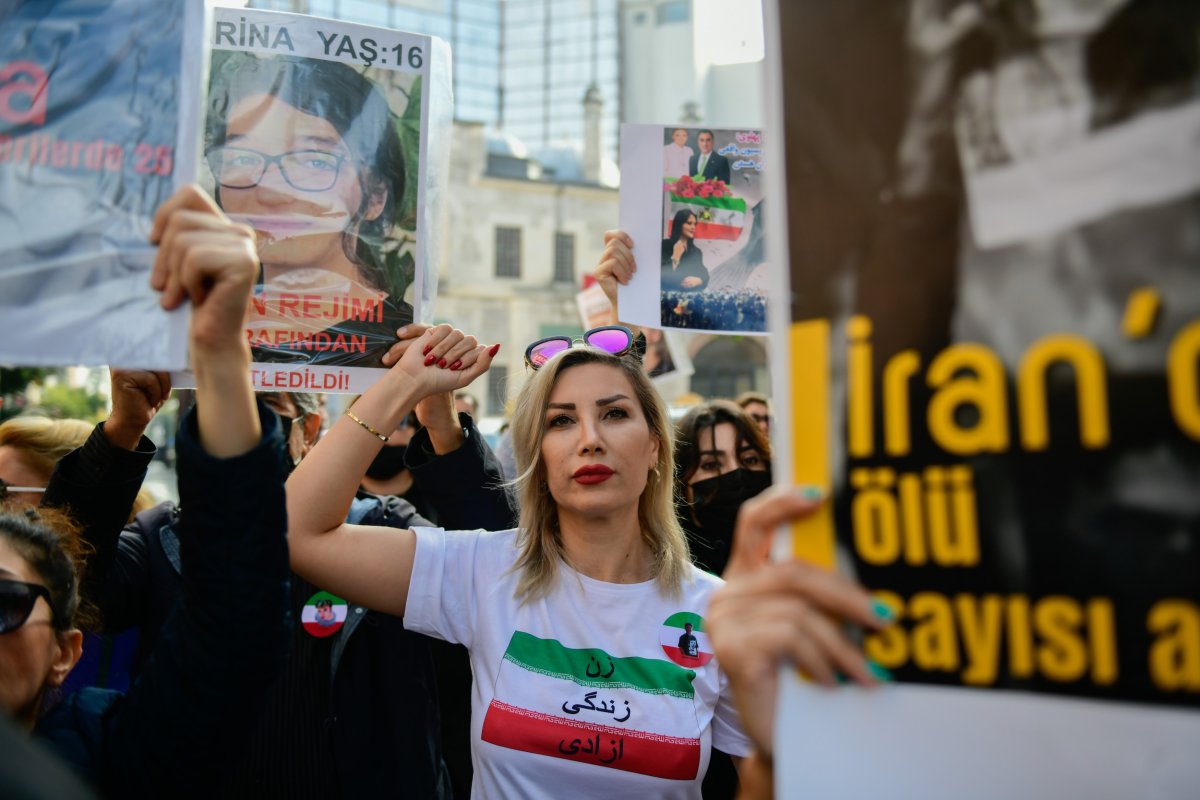A spokesperson for the Iranian parliament's presiding board blamed Western media for equating the arrests of protesters with death sentences, denying that protesters would be punished while reiterating that rioters needed to be dealt with harshly.
The Iranian Islamic Republic News Agency, a state media outlet, reported on November 6 that 227 members of the Iranian parliament signed a statement calling for the judiciary to deal "decisively with the inciters of the recent riots."
Seyyed Nizamuddin Mousavi, spokesman of the Islamic Council's Presidium, pushed back on reports the parliament was advocating for protesters to face the death penalty. He said in a statement to Tasnim News that the parliament never mentioned the death sentence and instead focused on "'revenge' of the fighters who took people's lives."
"Retribution is also applied to those who have taken the lives of others. It is not acceptable for people to kill people with weapons and slaughter them under the pretext of protest, and no appeasement is acceptable for these crimes, and these victims must be dealt with decisively," Mousavi said, according to Tasnim News.
The signed parliamentary statement has resulted in widespread condemnation due to Iran's history of executing protesters, prompting a special session on November 24 for the United Nations Human Rights Council to address "the deteriorating human rights situation in the Islamic Republic of Iran."

Protests began in Iran after the death of Mahsa Amini, a 22-year-old woman who was detained by the morality police for allegedly breaking strict headscarf rules. She was reportedly beaten after her arrest and died following a three-day coma.
The death toll among protesters as of Tuesday was 348, tweeted the nonprofit organization Human Rights Activists in Iran, including 52 children. It is estimated that 15,915 individuals from 951 protests across 140 cities have been arrested.
Mousavi said regarding the parliamentary statement that representatives differentiate "between disturbance and protest" and that "there is no reference to those who are protesting but did not resort to violence or bloodshed."
He also compared some protesters to ISIS fighters who "have attacked people's lives and property with weapons."
Iran sentenced the first protester to death on Sunday and has since sentenced four more people to death. Norway-based Iran Human Rights (IHRNGO), citing reports of at least 20 Iranian protesters currently facing charges punishable by death, is warning "of the possibility of hasty executions without any pre-warning."
Judiciary Chief Gholam-Hossein Mohseni-Eje'i in the parliamentary letter warned that rioters could be charged with "moharebeh," meaning "enmity against God," the BBC reported. Other crimes including "efsad fil-arz" (corruption on Earth) and "baghy" (armed rebellion) can carry the death penalty in Iran's Sharia-based system of law.
Brian Katulis, senior fellow and vice president of policy at the Middle East Institute, told Newsweek that it's difficult to know what's true and what's fiction given the history of the Iranian regime—which he said looks "very desperate" at this moment in time.
"The murders of teens in the streets by thugs have not really enhanced their image," he said.
Dr. Tarek Kteleh, a member of the non-governmental organization Citizens for a Secure and Safe America, which promotes security in the Middle East and democratic progress in Syria, told Newsweek that reports of executing protesters will eventually come to fruition.
"The regime and those hardliners will eventually execute and possibly kill protesters by shooting them in the streets if they start to feel more danger to their regime's existence," he said. "They helped Assad do that in Syria...so it is not surprising they do the same in Iran if the demonstrations expand further and become an existential threat to the current regime."
The future is difficult to forecast, he said. The Iranian regime could be more forceful and lead to deteriorated protests, or it could have the opposite effect and further galvanize demonstrators to become more of a threat in the defense of free speech.
He said it's also critical that the U.S. and the international community as a whole "put more pressure than ever before to tie the hands of the Iranian regime" so more forceful suppression is limited.
"One thing that could make a difference is the support those pro-democracy protesters get from the international community," Kteleh said. "If they were left alone and the Iranian regime got away while it's committing human right violations against protesters, it will be more difficult for them to continue against this oppressive regime."
Uncommon Knowledge
Newsweek is committed to challenging conventional wisdom and finding connections in the search for common ground.
Newsweek is committed to challenging conventional wisdom and finding connections in the search for common ground.
About the writer
Nick Mordowanec is a Newsweek reporter based in Michigan. His focus is reporting on Ukraine and Russia, along with social ... Read more
To read how Newsweek uses AI as a newsroom tool, Click here.






